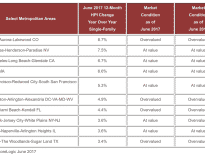Boston Mayor Marty Walsh worries about the city’s ability to pick up the burden if Congress scales back funding for affordable housing.
“Last year’s budget was the first time that we needed to use general fund money to balance the housing authority budget, so as they continue to cut back programs and services we have to backfill those spots. We can’t be throwing people out on the street,” Walsh told reporters Monday. He said, “It seems like Washington is getting out of the business of housing, and let’s be honest – that’s dangerous.”
Walsh spoke at a Monday afternoon rally outside Faneuil Hall opposing proposed federal cuts for housing programs.
U.S. Rep. Katherine Clark, a Melrose Democrat who opposed a Republican bill to reduce spending on the Department of Housing and Urban Development, told the crowd that thousands of people have called her office to oppose cuts.
“You keep fighting because our families are worth it,” Clark said.
Housing concerns are particularly acute in Boston, which has among the highest prices in the country.
The U.S. House Appropriations Committee advanced a fiscal 2018 funding bill in July that includes $38.3 billion for the Department of Housing and Urban Development, a $487 million decrease from the level enacted for fiscal 2017, according to the committee.
The bill also includes $6.6 billion for community planning and development programs, which is $209 million below the amount enacted for fiscal 2017, according to the committee.
Clark said funding is due to expire Oct. 1 and she anticipates further action on the housing legislation after Congress returns from its summer recess.
According to the Citizens’ Housing and Planning Association, which organized the rally, 13,551 new units of housing have been completed since Walsh laid out his housing plan in 2014, and 40 percent of those are “affordable for low and middle income households.”
Boston City Councilor Tito Jackson, who is running for mayor this year, said the city needs to be “more aggressive” about creating affordable housing.
“Let’s put it this way. Eighty-seven percent of the housing that’s being built in the city of Boston is being built for the top 25 percent, which means that people are getting gentrified and pushed out of their neighborhoods every day,” Jackson told the News Service. “We are not building housing at the pace that is going to continue to support the families that are living in the city of Boston.”




 |
| 
